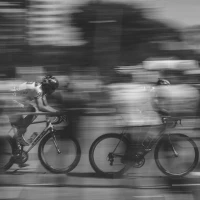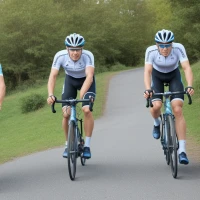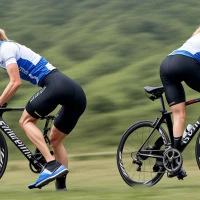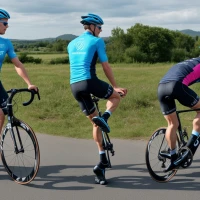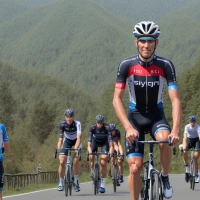Cycling is a symphony of physical exertion, mental stamina, and environmental serendipity. Whether you’re a spritely beginner or a seasoned pro, understanding the ideal duration for your bike rides can transform this symbiotic relationship into a source of tremendous health benefits and personal satisfaction. The question of ‘how long should a bike ride be’ resonates through the minds of many pedal enthusiasts. As we dig into the journey of Perfect Pedal Pushing, we not only aim to answer this query but to shatter the ambiguity around cycling durations, forging a path to mastering the ideal duration for maximum cycling benefits.
When it comes to cycling, there’s a spectrum of goals—fitness improvement, weight management, endurance building, or simply the joy of being amidst the blurry backdrop of passing landscapes. The beauty of cycling lies in its flexibility; distances can be sculpted to fit individual goals and lifestyles. But how do we fine-tune duration for effectiveness? Let’s dive in and uncover the intricacies that will guide you to optimize your time on two wheels.
Crafting Your Cycling Plan: Key Factors to Consider
Every cyclist’s journey is unique, and your optimal bike ride duration hinges on a few pivotal considerations. Bebenefits of cycling machine for ladiese fastening your helmet, let’s explore these determinants to tailor your experiences effectively.
Your Cycling Objectives
Personal Fitness Goals
Analyzing personal fitness goals is essential as it’s the compass that directs the path and length of your 10 km cycling benefits workouts. If your aim is to boost cardiovascular health, moderate-intensity rides of 30 minutes a day may suffice. For endurance training, longer, consistent rides are obligatory.
Weight Management and Loss
For those pedaling towards weight management or loss, the duration plays a critical role. Engaging in longer rides at a moderate pace can encourage the body to burn fat as a primary fuel source, efficiently aiding weight loss.
Physical Condition and Experience
Assessing Your Fitness Level
It’s important to acknowledge your starting point. Beginners may find that shorter, more frequent rides are more manageable and enjoyable, while veteran cyclists may require extended durations to feel challenged.
Health Constraints
Riders with health limitations need to take special care when determining ride length, ensuring they stay within safe and beneficial boundaries. jazmine beauty brush set
Environmental and Equipment Considerations
Bike Type and Fit
The comfort of your ride is influenced by your equipment. A well-fitted bike can mean the difference between a 15-minute struggle and an hour-long pleasure cruise.
Climate and Terrain
The environment also dictates ride duration. Higher temperatures and challenging terrains naturally reduce the time spent cycling body shape, necessitating adjustments for safety and endurance.
Establishing Your Cycling Duration Framework
With your unique profile and what is hand cycling backdrop in focus, let’s begin to construct your customized cycling duration framework.
For Health and Fitness Enthusiasts
Cardiovascular Improvement
- 30 minutes a day for beginners, aiming for at least five days a week.
- Consistent, moderate effort is a key to developing heart health.
Muscle Tone and Strength
- Rides ranging from 45 minutes to 1 hour, incorporating intervals, can help define and build muscles.
For Weight Control and Loss
Fat Burning Zone
- Aim for a steady pace for 1 to 2 hours to maximize fat usage for energy.
- Consistency is crucial; consider daily rides to see significant changes.
For Competitive Cyclists and Endurance Junkies
Endurance Building
- Long rides exceeding 2 hours, progressively adding time as stamina increases.
- Periodization is vital; mix in shorter, more intense sessions to manage recovery.
Riding Intelligently: Duration Isn’t Everything
It’s not merely about how long your ride lasts, but how you utilize that time. Smart cycling involves a strategic approach to riding durations to reap the most benefit.
Quality Over Quantity
Interval Training
Engage in high-intensity interval training (HIIT) on the bike. These shorter sessions can often provide equal or more benefits than longer rides due to increased metabolic rate even after cycling.
Recovery Rides
Incorporate recovery rides into your routine. After a day of intense cycling, a short and easy ride can help in muscle recovery.
Maximizing Every Minute on Your Bike
Even the most well-planned ride durations must be optimized for maximum effect. Here’s how you can make every minute count.
Before You Ride: Preparation
- Proper nutrition; consume a balanced meal approximately 2 hours before riding.
- Hydrate well to prevent early fatigue and dehydration-related performance dips.
During Your Ride: Execution
- Start with a warm-up to prime your muscles, gradually increasing your effort.
- Focus on maintaining a steady pace that aligns with your day’s goal.
After Your Ride: Recovery
- A cool-down period to gradually lower your heart rate.
- Post-ride stretching to alleviate muscle tightness.
Overcoming Obstacles
Scheduling Conflicts
Making Time
- Early morning or evening rides can dodge a busy schedule.
- Commuting to work or errands can incorporate cycling into daily routine effortlessly.
Lack of Motivation
Staying Committed
- Join a cycling group for accountability.
- Set incremental goals to maintain enthusiasm.
Measuring Progress and Tuning Your Approach
Analytics and Metrics
Keeping Track
- Use a cycling app or GPS device to monitor your ride lengths and improvements.
- Pay attention to how your body feels post-ride to gauge if you’re pushing the limits or if you can handle a boost in ride duration.
The Final Sprint
Incremental Improvements
Evolving Your Cycling Duration
- Be patient; substantial improvements don’t happen overnight.
- Gradually increase your ride duration as your fitness improves.
- Be mindful of overtraining and listen to your body’s cues.
Syncing Duration with Lifestyle
Harmonize Your Habit
- Let your cycling routine ebb and flow with life’s demands.
- Prioritize balance to ensure cycling remains a sustainable and enjoyable part of your routine.
When pondering ‘how long should a bike ride be’, remember that the answer varies based on a multitude of factors, including personal goals, fitness level, equipment, and environmental conditions. Cycling is not a one-size-fits-all activity, and your ride durations should reflect your individuality as much as your objectives. Through thoughtful consideration, preparation, and execution of your riding plan, you can master the perfect pedal pushing technique, finding your ideal duration for maximum cycling benefits. Keep rolling, keep exploring, and let the journey sculpt the optimal path for your cycling success.



